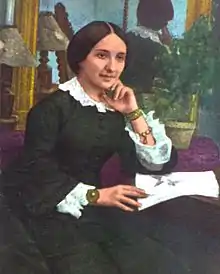Antonia de Oviedo Schöntal
Antonia de Oviedo Schöntal (16 March 1822 – 28 February 1898) was a Swiss Roman Catholic professed religious and the co-founder of the Oblates of Holy Redeemer – an order that she established alongside the Benedictine Bishop José María Serra. She assumed the religious name of "Antonia María of Mercy" and worked alongside poor and disadvantaged women.[1][2]
Venerable Antonia de Oviedo Schöntal | |
|---|---|
 | |
| Religious | |
| Born | 16 March 1822 Lausanne, Vaud, Switzerland |
| Died | 28 February 1898 (aged 75) Ciempozuelos, Madrid, Kingdom of Spain |
| Venerated in | Roman Catholic Church |
| Attributes | Religious habit |
| Patronage | Oblates of the Holy Redeemer |
She was declared Venerable on 7 July 1962 after Pope John XXIII approved the fact that she lived a life of heroic virtue. A miracle needed for her to be beatified all but requires papal approval after having received approval from the Congregation for the Causes of Saints back in 2005.
Life
Antonia de Oviedo Schöntal was born on 16 March 1822 in Lausanne to the Spanish Antonio de Oviedo and the Swiss Susanna Schöntal.[2] Her father left for London to seek work but died there when she was in her childhood.
In February 1848 she left home and travelled to Spain where she found work as a governess of the three daughters of Queen mother Maria Christina of the Two Sicilies and her second husband Agustín Fernando Muñoz, Duke of Riánsares.[2] While there she learned to master several languages and developed strong tastes for the arts and literature that extended to painting and music.[1] Schöntal remained in her position until 1860 when the princesses all left home following marriages. Her departure came in October 1860 with the marriage of the last daughter: Maria Cristina Muñoz Borbón (19 April 1840 – 19 December 1921).
In that former position she had met the Benedictine Bishop José María Serra (11 May 1810 – 8 September 1886) who served as the Bishop of Perth in Australia.[2] In 1862 he had submitted his resignation to Pope Pius IX and assumed residence in Madrid. He later became her spiritual director and was a guest in March 1863 of Schöntal and her paternal aunt at Las Avellanas; the Redemptorist priest Loyodice was another guest.[1]
Serra encouraged her to know the situation of women who worked as prostitutes despite the fact that she had resisted the idea of working with them. After a while she began to see their plight and offered financial resources to help Serra tend to these women. On 1 June 1864 the first refuge for women opened and on 7 June 1864 the first women came into the home: one who was Spanish and another who was French. Pope Leo XIII would later call their work, "not only a work of charity but a work of redemption".[1]
On 2 February 1870 the two established their new religious congregation at which point she made her solemn profession and assumed the religious name of "Antonia María of Mercy".[1]
She died in 1898.
Beatification process
The process of beatification started in the Archdiocese of Madrid with an informative process that commenced on 23 November 1927 and concluded in 1932. Her writings received the approval of theologians on 2 August 1942 who deemed that the writings she left behind were indeed in line with the magisterium of the Christian faith. The formal introduction of the cause came on 1 February 1948, under Pope Pius XII, in which she was accorded the title of Servant of God as the first official stage in the process despite the previous actions the cause undertook.
An apostolic process was held in 1952 in order to continue the work of the informative process while the two processes received the validation of officials from the Congregation of Rites on 11 March 1955; this would allow for them to commence their own line of investigation into the merits of the cause.
She was proclaimed to be Venerable on 7 July 1962 after Pope John XXIII confirmed that the late religious had lived a model life of heroic virtue.
The miracle required for her beatification was investigated in Spain and received validation from the Congregation for the Causes of Saints on 26 April 1991. The medical board based in Rome approved the miracle on 24 October 2002 while theologians approved it on 15 April 2005; the C.C.S. granted their final approval on 6 December 2005.
The miracle now requires papal approval for the beatification to take place.
References
- "Our Founders". Oblate Sisters of the Most Holy Redeemer. Retrieved 7 June 2016.
- "Founders". Mother of Good Counsel. Retrieved 7 June 2016.